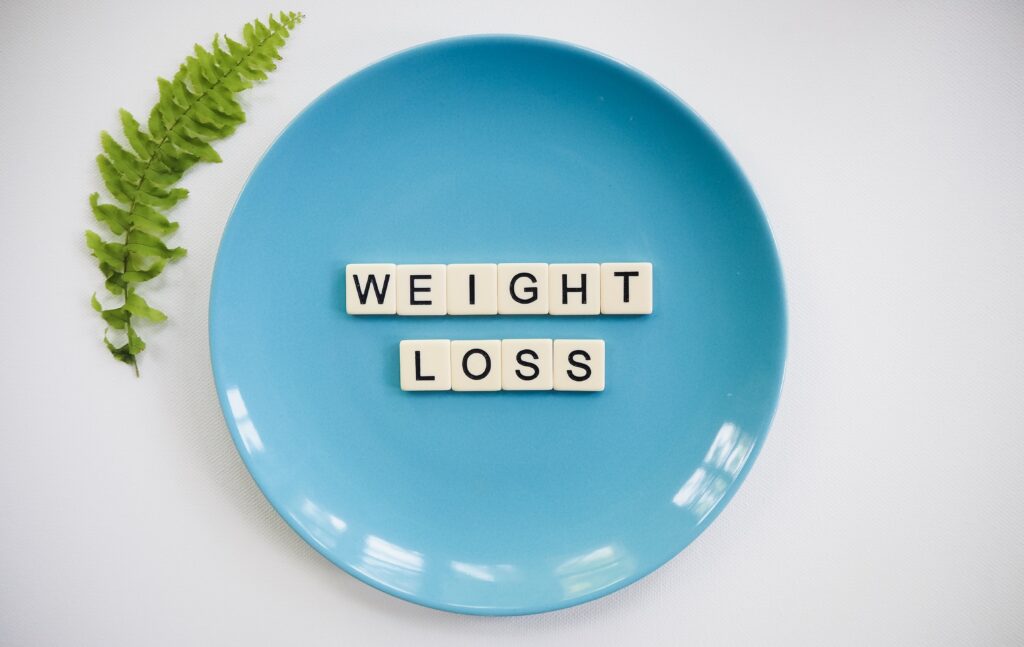Before considering some of the more unusual obstacles to weight loss, it is worth spending a little bit of time first looking at what a healthy diet really means. There is a lot of confusion amongst slimmers as to the best diet for long-term successful weight loss, and some common mistakes around so-called dietary improvements are often the major reason why slimming efforts fail.
For example, one of the biggest mistakes is thinking that “diets” work in the first place. Nothing can replace a well-balanced diet that involves long-term lifestyle changes (including your attitude to food). Any temporary program that proposes severe restrictions on calorie intake or particular food groups isn’t sustainable, can damage your health and will usually only deliver short-term results (often leading to additional weight gain once the diet is over).
Starving your body is not the answer; nor is living on lettuce leaves. The best way to lose pounds and keep them off is to eat a healthy diet and, subject to any health conditions and medical advice to the contrary, exercise on a regular basis.
A “healthy diet” may be different for everyone (for example, depending on your body’s precise requirements), but the overall guiding principles are the same and pretty simple. For example:-
- avoid foods that are processed / refined and contain artificial chemicals (such as colourants, flavourings, additives and preservatives)
- avoid foods that are high in saturated fat, sugar and salt (and are therefore acid-forming in the body)
- include plenty of fresh fruit, vegetables, leafy green plants and other natural whole foods in your diet (which tend to have an alkalising effect on the body)
- opt for lean sources of protein (such as fish and plant proteins)
- opt for seasonal, organic produce wherever possible
- opt for complex, rather than simple, carbohydrates
- keep hydrated (preferably with filtered water – avoid sodas, even the diet variety).
Of course, these are just broad guidelines, but they are a good rule of thumb for anyone trying to lose weight. Plus, they are sustainable because they don’t have to be followed 100% of the time; it is enough to stick to them most of the time, while enjoying occasional ‘treats’ in moderation.
If you feel like you’ve already nailed these aspects of weight loss, but you still aren’t seeing results, the following factors might be hindering your efforts.
Unstable blood sugar levels
Keeping your blood sugar levels stable is probably one of the most important factors in maintaining a healthy weight. This is because it has a major bearing on your appetite and energy levels. Unstable blood sugar can lead to a host of symptoms, including hunger, cravings, fatigue, depression, digestive problems and more – all of which can hinder different aspects of your weight loss regime.
This is one of the reasons it is so important to choose your carbohydrates with care; eating simple carbohydrates (like white bread and refined sugar) will lead to a rapid spike in blood sugar levels and a corresponding surge in energy. However, this will quickly be followed by a drop as your body attempts to re-balance the levels. In contrast, when you eat complex carbohydrates (like whole grains and vegetables), your body does what it was designed to do. It digests these foods and gradually releases their energy in a controlled manner.
It is estimated that as many as 3 in every 10 people are unable to properly control their blood sugar levels from years of poor diet; it may go too high and then drop too low. The result, they become increasingly heavy and lethargic. Get this under control with appropriate dietary improvements and the result will be consistent energy levels and weight that is stable.

Food intolerance, allergy or poor digestion
An inefficient digestive system could be contributing to your weight loss problems in a number of ways. Inflammation is the key concern, as an inflamed gut can lead to a toxic fatty liver, insulin resistance and, in turn, to higher insulin levels. Linked to the importance of stable blood sugar levels discussed above, insulin is a fat storage hormone.
So what are some of the most common causes of gut inflammation?
- Dysbiosis – an imbalance in the good and bad bacteria in the gut. Good bacteria play a central role in everything from digestion and nutrient absorption, to the immune system, but this delicate balance can so easily be disrupted. For example, by illness or poor diet. Research has shown that high-fat diets actually change the bacterial flora in the gut. Toxin-producing pathogens are allowed to thrive, while anti-inflammatory and protective bacteria die off.
- A food allergy or intolerance: Nowadays, it is very common to hear that someone is “dairy-free” or “gluten-free” or following another type of “free-from” diet, because food allergies and intolerances have unfortunately become very prevalent. Food allergies / intolerances, inflammation and weight issues are closely related. This is because, eating foods to which you are allergic or intolerant can cause inflammation. Once again, this makes your adrenal glands secrete hormones which can destabilise your insulin and blood sugar levels. The high level of insulin affects the activity of two enzymes, which cause your body to hold on to and deposit fat rather than allowing you to burn it for energy. In this way, food allergies and intolerances can lead to weight gain and/or hinder weight loss. What’s more, a high level of body fat and toxins from a poor diet can promote inflammation and exacerbate the problem.
Hormonal balance
Hormones are chemical substances that help to regulate certain processes in your body, including blood sugar levels, blood water levels, your rate of metabolism, your emotional state, immune system response and more. It is therefore easy to see how a hormonal imbalance (which could be caused by any number of factors, such as medication, stress, diet and other lifestyle factors), could contribute to weight gain.
A good case in point is the fact that many women gain weight during the menopause. Similarly, if your thyroid is not making enough thyroid hormone, you are likely to feel tired and weak and become more prone to gaining weight. This is because without enough of the thyroid hormone, your metabolism slows, not to mention the fact that you are less likely to exercise when you are feeling exhausted!
Polycystic ovary syndrome (PCOS) is another common hormonal problem, which tends to arise in women of childbearing age. Most women with PCOS grow small cysts on their ovaries and the condition leads to hormone imbalances, which affect their menstrual cycle. Women with this condition are resistant to insulin, which as we have seen above may lead to weight gain.
Stress
When we’re feeling stressed, we may either reach for “comfort food” or rely on convenient fast-foods or ready-meals because we are short on time. This is never conducive to weight loss success and, to make matters worse, stress inhibits the release of digestive enzymes, which are essential for the proper breakdown of food. As we have already seen above, poor digestion can have its own impact on slimming efforts.
But, there are actually more scientific ways in which stress can actively lead to weight gain or hinder weight loss efforts. When involved in a stressful situation, our bodies go into survival mode. Cortisol, the “stress hormone”, is secreted and this leads to an increase in appetite. Similarly, weight gain is a common symptom of Cushing’s syndrome, a condition in which you are exposed to too much cortisol, which in turn causes weight gain and other abnormalities.
Fat-phobic
Slimmers can often become a little fat-phobic, particularly given that the media are so often hammering home the message that saturated ‘hard’ fats and trans fats are so bad for us. However, it is important to remember that not all fats are unhealthy; quite the opposite in fact. Certain fats (such as polyunsaturated fats, essential fatty acids and Omega oils) are beneficial for health.
While more often associated with healthy bones, skin, hair and nails, these healthy fats are actually involved in a wide range of weight-related processes in the body, including metabolism, hormonal balance and weight management. Hormones are produced using certain fatty acids and cholesterol, so if we’re missing these nutrients, hormone problems can arise simply because the body doesn’t have the nutrients it needs to make them.
Toxin overload and a strained liver
Our bodies are exposed to an ever-increasing number of toxins and pollutants on a daily basis from, for example: cigarettes, air pollution, water pollution, toxins produced through digestion, medication, food and drink (including caffeine, dairy products, sugar, alcohol, additives, preservatives, colourants, flavourings, insecticides etc), stress, cosmetics and toiletries, household cleaners, building materials and furnishings, heavy metals in the environment, radiation and even clothing.
The signs of being overloaded with toxins can be categorised into different body systems, many of which affect weight loss (as we have already seen). For instance, the immune system, the hormonal system, the digestive system and the liver.
A liver under strain will often lead to weight issues. This is because it is involved in digestion; the liver manufactures bile – a substance necessary for fat digestion. Bile is also the major route for the excretion of cholesterol and other fats. If the liver is working too hard because, for example, it is busy processing too many toxins, other vital functions such as fat burning are put on hold. This is also one of the main reasons you will find that losing weight becomes more difficult if you regularly consume alcohol.
The bottom line
So, as you can see, successful long-term weight loss is about so much more than just a quick diet. It involves lifestyle changes, a change in your attitude to food and an assessment of your overall health.
The various systems of the body are inherently linked. If one is strained, or not working optimally, the likelihood is that it will have a knock-on effect on other systems. What this means in practice is that, a problem with your digestion, liver, hormonal balance, toxic load, emotional state or other aspect of your health could have a significant impact on your slimming efforts. Address these and your weight loss goals should be a lot easier to achieve.
Don’t forget to check out our Facebook pages for more health tips like these, as well as latest news and exclusive offers (like the one below)!




